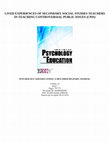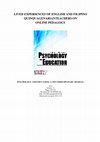Papers by VIVIAN I. BUHAIN

Zenodo (CERN European Organization for Nuclear Research), Sep 14, 2023
The COVID-19 pandemic prompted an immediate shift from in-person to online interaction classes an... more The COVID-19 pandemic prompted an immediate shift from in-person to online interaction classes and different learning methodologies. The purpose of this study was to elucidate the lived experiences of ten quinquagenarians teaching English and Filipino online pedagogy in Marikina's School Division. In analyzing the data, the Researcher used individual online in-depth interviews, online focus group discussions, and observations. He collected the data through the Colaizzi (1978) process. Eight (8) themes emerged from the interviews: educator's dedication, emotional distress, technological offline, pedagogical frustration, educational stressors, struggle educator, technical support, pro-traditional learning, and ICT skills for quinquagenarians. The study concluded that with the unexpected deployment of online pedagogical approaches, the learners saw this teaching method as a vexatious atmosphere every day. Limited digital knowledge and internet connectivity were the major challenges in delivering education in the new normal. Too much stress every day and being paranoid about doing digital tasks assigned by the Department of Education made the participants' lives stressful. The online pedagogy made the lives of ten participants complicated every day, every hour, and every minute during the pandemic. The participants showed different styles to cope with the challenges of online pedagogy. It may be concluded that the participants had no skills in terms of ICT integration. The traditional way of teaching still required teachers to be physically present within the confines of a classroom and to be learning alongside their respective students. In this case, it may be concluded that traditional learning pedagogy was still at the heart of the English and Filipino quinquagenarian teachers.

Psychology and Education: A Multidisciplinary Journal, Jul 26, 2024
This study explored the crucial importance of teaching controversial public issues in, acknowledg... more This study explored the crucial importance of teaching controversial public issues in, acknowledging the prevalent occurrence of differing opinions among students about numerous issues facing society. Using a transcendental phenomenological method, this research explored the complex experiences of secondary social studies teachers as they navigated these controversial issues in public schools. The study illuminated the lived experiences of five Kontemporaryong Isyu teachers through and in-depth interview. These teachers were under the jurisdiction of the Schools Division Office of Caloocan City. The findings emphasized several important themes, such as the importance of thorough training for teachers, the need for curriculum to address current societal issues, the autonomy given to teachers in choosing topics and teaching methods, the use of learner-centered teaching approaches, and the difficulties faced in effectively engaging students. Additionally, the study emphasized the crucial need for teachers to promote democratic values, such as equity and reverence, to encourage substantial discussions and analytical reasoning among pupils. These observations had implications for secondary Social Studies teachers and Social Studies Administrators, highlighting the importance of continuous professional growth and the establishment of supportive educational settings that promoted the development of well-informed citizens and encouraged students to engage in critical thinking.

SSRN Electronic Journal
Designed with a qualitative case study, this research aimed to understand senior language teacher... more Designed with a qualitative case study, this research aimed to understand senior language teachers' challenges in online pedagogy and how they coped with those challenges. Utilizing procedures introduced by Creswell (2009), the Researcher first organized the data by transcribing each interview, then by reading and looking at all the data. After that, she coded the data, organizing the text by its meaning and developing its cluster of meaning into themes. Out of the verbatim recording, she identified seven themes, which were intensively analyzed. Analysis showed that language teachers in online pedagogy encountered challenges such as stressful experiences, digital phobia, digital webinars, digital stress, virtual break, and virtual rules. The study participants coped with these challenges by attending webinars, training, and personal coaching by colleagues and relatives. The findings suggest that using online pedagogy in teaching English created a significant experience for students, discouraged the teachers' attention to quality teaching, and kept them unmotivated to teach. Because of the online platform, senior language teachers were no longer confident in delivering their instructions through integrating technology into their English language instruction. The results also revealed that senior language teachers need to watch YouTube videos, participate in digital webinars, and receive online training to address the gap among them.

Psychology and Education: A Multidisciplinary Journal , 2023
The COVID-19 pandemic prompted an immediate shift from in-person to online interaction classes an... more The COVID-19 pandemic prompted an immediate shift from in-person to online interaction classes and different learning methodologies. The purpose of this study was to elucidate the lived experiences of ten quinquagenarians teaching English and Filipino online pedagogy in Marikina's School Division. In analyzing the data, the Researcher used individual online in-depth interviews, online focus group discussions, and observations. He collected the data through the Colaizzi (1978) process. Eight (8) themes emerged from the interviews: educator's dedication, emotional distress, technological offline, pedagogical frustration, educational stressors, struggle educator, technical support, pro-traditional learning, and ICT skills for quinquagenarians. The study concluded that with the unexpected deployment of online pedagogical approaches, the learners saw this teaching method as a vexatious atmosphere every day. Limited digital knowledge and internet connectivity were the major challenges in delivering education in the new normal. Too much stress every day and being paranoid about doing digital tasks assigned by the Department of Education made the participants' lives stressful. The online pedagogy made the lives of ten participants complicated every day, every hour, and every minute during the pandemic. The participants showed different styles to cope with the challenges of online pedagogy. It may be concluded that the participants had no skills in terms of ICT integration. The traditional way of teaching still required teachers to be physically present within the confines of a classroom and to be learning alongside their respective students. In this case, it may be concluded that traditional learning pedagogy was still at the heart of the English and Filipino quinquagenarian teachers.











Uploads
Papers by VIVIAN I. BUHAIN